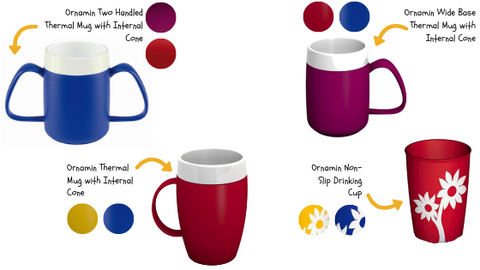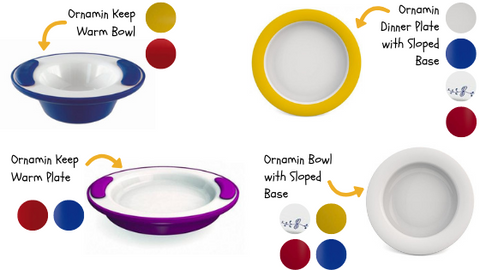Free delivery on orders over £50, only £4.95 under £50
Free delivery on orders over £50, only £4.95 under £50
Welcome to our blog, your one-stop resource for news, features and resources for living life to the fullest. View our articles on the latest mobility products and features with disability bloggers.
Posted by Mike Phipps on April 25, 2019

This article was updated on 23/04/2024.
There are many modern solutions to assist with independent eating and drinking for anyone living with a disability or condition which may affect their ability to hold cutlery, move food around their plate or drink. In this guide, we take a look at the different eating and drinking aids which can help you and your loved ones to enjoy mealtimes.
A stroke can occur at any time to anyone, causing effects like hemiplegia, sensitivity issues with arms and legs, and speech or vision problems. Living with the sudden symptoms of a stroke can require the use of mobility aids and adapted dining wear. After a stroke, everyday movement sequences need to be relearned by practising and adapted cutlery and tableware can offer the benefits of independent eating, helping the user to feel more confident and enjoy their meals.
For more information, view our guide on life after a stroke.
Parkinson's disease is a condition which affects the central nervous system and causes symptoms such as shaking and tremors which can make it difficult to hold cutlery or a cup. With the help of adapted tableware such as weighted cutlery and sloped plates, individuals living with Parkinson's can retain independence and confidence when eating and drinking.
View our information guide for more details on independent living with Parkinson's.
Multiple Sclerosis (MS) can cause motor issues along with numbness and tingling in the arms and hands which make it harder to use standard dinnerware. Using sloped bowls and plates and cups with handles and non-slip designs can make a great difference at mealtimes as they have discreet features which can help the user to scoop food easily or with one hand, while two handles mugs or non-slip cups offer a better grip.
Dementia is a condition which affects mostly older individuals, causing symptoms such as forgetfulness and a lack or increase of appetite. Contrasting and vivid colours on crockery and cutlery can help to excite the appetite and encourage users to eat regularly as well as being more easily recognisable compared to plain tableware.
For more information on living with dementia, view our condition guide here.
Our range of Ornamin drinking aids include adaptive features, such as handles to ensure a stronger grip, a cone-shaped interior to reduce spills and a thermal function to keep drinks warm if the user requires more time to finish them. Additionally, the mugs and cups are all brightly coloured to be highly visible to users with limited vision, whilst looking modern and stylish in a home environment.

For inclusive dining, our range of Ornamin bowls and plates help to promote independence, with their sloped design to encourage one-handed eating and an internal chamber which can be filled with hot or cold water to keep the food temperature constant. Available in a range of vivid colours and patterns to provide a strong contrast and look contemporary in any environment.

Information on independent dining and adapted tableware products by Ornamin.

Kate Makin qualified as an occupational therapist (OT) in 2001 with a BSc (Hons) in Occupational Therapy. She is a member of the Royal College of Occupational Therapists (RCOT).
As a registered occupational therapist (OT), Kate is a science degree-based, health and social care professional, taking a “whole person” approach to both physical and mental health and wellbeing. This enables individuals, of all ages, to achieve their full potential and lead as independent life as possible.
Click here for Kate’s registration with the Health and Care Professions Council.
Throughout her career, Kate has worked in many different clinical settings, in both the public and private sector. Kate has been running her own independent occupational therapist business since 2009. She is passionate about disability aids and adaptations, with a specialist interest in postural management and seating.
As Ability Superstore’s resident OT, Kate is on hand to offer professional advice and answer any queries.